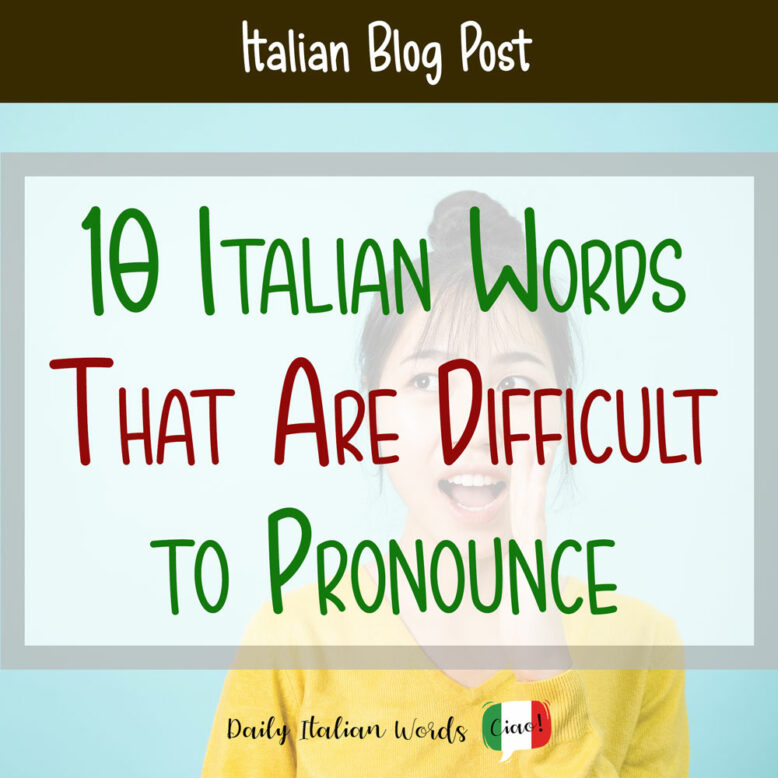As languages go, I would classify Italian as one of the easiest to learn for English speakers, at least in terms of pronunciation. A big advantage is that it is a highly phonetic language – unlike English and French, for example – so what you see written on paper is very close to how it is spoken.
Another plus is that there are only seven vowel sounds (a, i, u, e, ɛ, o and ɔ), two semi-consonants and twenty one consonants, the majority of which are also found in English.
Italian pronunciation can become tricky for English speakers when:
- there are unfamiliar consonants or consonant clusters within the word such as /ts/ (grazie), the rolled /r/ (rompere) and /ʎ/ (maglia)
- familiar consonants appear in unfamiliar places such as the word initial /ɲ/ (gnomo) and /zg/ (sgarbo)
- there is a double consonant such as /tt/ (fatto).
In this article, I’ve listed ten Italian words that my tongue still gets tangled around, even after more than ten years of speaking the language. (And yes, that’s me in quite a few of the audio files, so please be kind if you’re a native Italian speaker!) Let me know in the comments below if you’re able to say them without garbling the pronunciation! 😉

1. Vorrei
The word vorrei may be short but that doesn’t mean it’s easy to pronounce! Not only does the infamous rolled /r/ make an appearance but to add insult to injury, there are two of them side by side!
Unfortunately for us, this word is used a lot in Italian because it means “I would like…” When my tongue isn’t feeling very flexible, I personally use the slightly less polite Posso avere… (Can I have…) instead! 😉
2. Ridarella
The word ridarella means giggle and you may well provoke a few giggles from your Italian friends when you try to pronounce this word properly! In addition to having two rolled Rs, it also has the double consonant /ll/ whose pronunciation requires short pause between each /l/.
3. Gnorri
Did I mention that double Rs are the bane of my existence? The word gnorri, which always appears in the set phrase fare gli gnorri (to play dumb), serves up both the double /r/ and the word initial /ɲ/. That’s a lot of difficult consonants for such a short word!
4. Pneumatico
Now we’re getting into some of the longer words with difficult pronunciation. In the case of pneumatico, which means tire (of a car), there is something quite challenging about pronouncing the initial /pn/ given that we don’t have this combination of sounds in English. Wouldn’t you agree?
5. Sbagliare
If you make a mistake or two when trying to pronounce sbagliare, don’t worry, because that’s exactly what this verb means! The reason this word can be difficult for English people to say is because it starts with the unfamiliar word-initial consonant cluster /zb/ and contains the phoneme /ʎ/.
6. Scoraggiare
Scoraggiare – which means to discourage – is difficult enough due to the rolled /r/ and double /gg/ but to make matters worse, it also sounds very similar to another word with quite a different meaning: scoreggiare (to fart)! I still mix them up to this day!
7. Tagliuzzare
Tagliuzzare (to snip) isn’t a word that often surfaces in conversation, and good thing too given that it’s quite the tongue twister, especially after a couple of glasses of red wine! The unfamiliar phonemes /ʎ/, /dz/ and /r/ all make an appearance.
8. Aiuola
Have trouble getting your mouth around all those tricksy vowels? Then try saying the word aiuola (flower bed) ten time fast! I can guarantee that the four adjacent vowels will keep you on your toes.
9. Atterrare
Atterrare (to land), with its three Rs and double /tt/, is an excellent verb to practise your pronunciation, especially if you take on some of the conjugated forms such as atterreremmo (we would land) or atterreranno (they will land). Just don’t expect to “land” on your feet the first time you say it!
10. Gli
Our final word gli, which means to him/them or the (plural definite article), is deceptively short but incredibly difficult to pronounce for English speakers due to the word initial ʎ. This is especially true when it is followed by pronouns such as ne (gliene) or li (glieli). I tried to say it quickly the other day, only to wind up with my tongue in a knot!
Which words do you find difficult to pronounce in Italian? Let us know in the comments below!

Heather Broster is a graduate with honours in linguistics from the University of Western Ontario. She is an aspiring polyglot, proficient in English and Italian, as well as Japanese, Welsh, and French to varying degrees of fluency. Originally from Toronto, Heather has resided in various countries, notably Italy for a period of six years. Her primary focus lies in the fields of language acquisition, education, and bilingual instruction.


